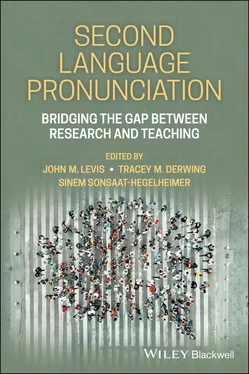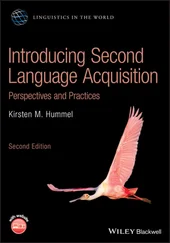Second Language Pronunciation
Здесь есть возможность читать онлайн «Second Language Pronunciation» — ознакомительный отрывок электронной книги совершенно бесплатно, а после прочтения отрывка купить полную версию. В некоторых случаях можно слушать аудио, скачать через торрент в формате fb2 и присутствует краткое содержание. Жанр: unrecognised, на английском языке. Описание произведения, (предисловие) а так же отзывы посетителей доступны на портале библиотеки ЛибКат.
- Название:Second Language Pronunciation
- Автор:
- Жанр:
- Год:неизвестен
- ISBN:нет данных
- Рейтинг книги:5 / 5. Голосов: 1
-
Избранное:Добавить в избранное
- Отзывы:
-
Ваша оценка:
- 100
- 1
- 2
- 3
- 4
- 5
Second Language Pronunciation: краткое содержание, описание и аннотация
Предлагаем к чтению аннотацию, описание, краткое содержание или предисловие (зависит от того, что написал сам автор книги «Second Language Pronunciation»). Если вы не нашли необходимую информацию о книге — напишите в комментариях, мы постараемся отыскать её.
Second Language Pronunciation: Bridging the Gap Between Research and Teaching
Second Language Pronunciation: Bridging the Gap Between Research and Teaching
Second Language Pronunciation — читать онлайн ознакомительный отрывок
Ниже представлен текст книги, разбитый по страницам. Система сохранения места последней прочитанной страницы, позволяет с удобством читать онлайн бесплатно книгу «Second Language Pronunciation», без необходимости каждый раз заново искать на чём Вы остановились. Поставьте закладку, и сможете в любой момент перейти на страницу, на которой закончили чтение.
Интервал:
Закладка:
8 Brown, C. A. (1998). The role of the L1 grammar in the L2 acquisition of segmental structure. Second Language Research, 14(2), 136–193. https://doi.org/10.1191/026765898669508401
9 Brown, H. D., & Lee, H. (2015). Teaching by principles: An interactive approach to language pedagogy (4th ed.). Pearson.
10 Catford, J. C. (1987). Phonetics and the teaching of pronunciation: A systemic description of the teaching of English phonology. In J. Morley (Ed.), Current perspectives on pronunciation: Practices anchored in theory (pp. 83–100). TESOL.
11 Celce-Murcia, M., Brinton, D. M., & Goodwin, J. M. (2010). Teaching pronunciation: A course book and reference guide. Cambridge University Press.
12 Chang, C. B. (2018). Perceptual attention as the locus of transfer to nonnative speech perception. Journal of Phonetics, 68, 85–102. https://doi.org/10.1016/j.wocn.2018.03.003
13 Derwing, T. M., & Munro, M. J. (2013). The development of L2 oral language skills in two L1 groups: A 7‐year study. Language Learning, 63(2), 163–185. https://doi.org/10.1111/lang.12000
14 Derwing, T. M., & Munro, M. J. (2015). Pronunciation fundamentals: Evidence-based perspectives for L2 teaching and research. John Benjamins Publishing Company.
15 Derwing, T. M., Munro, M. J., & Thomson, R. I. (2008). A longitudinal study of ESL learners’ fluency and comprehensibility development. Applied Linguistics, 29(3), 359–380. https://doi.org/10.1093/applin/amm041
16 Derwing, T. M., Thomson, R. I., Foote, J. A., & Munro, M. J. (2012). A longitudinal study of listening perception in adult learners of English: Implications for teachers. Canadian Modern Language Review, 68(3), 247–266. https://doi.org/10.3138/cmlr.1215
17 Ding, S., Liberatore, C., Sonsaat, S., Lučić, I., Silpachai, A., Zhao, G., Chukharev-Hudilainen, E., Levis, J., & Gutierrez-Osuna, R. (2019). Golden speaker builder–An interactive tool for pronunciation training. Speech Communication, 115, 51–66. https://doi.org/10.1016/j.specom.2019.10.005
18 Ervin-Tripp, S. (1974). Is second language learning like the first? TESOL Quarterly, 8(2), 111–127. https://doi.org/10.2307/3585535
19 Flege, J. E. (1995). Second language speech learning: Theory, findings, problems. In W. Strange (Ed.), Speech perception and linguistic experience: Issues in cross-language research (pp. 233–277). York Press.
20 Flege, J. E. (2003). Assessing constraints on second-language segmental production and perception. In N. O. Schiller & A. S. Meyer (Eds.), Phonetics and phonology in language comprehension and production: Differences and similarities (pp. 319–355). Mouton de Gruyter.
21 Flege, J., & Bohn, O. (2021). The Revised Speech Learning Model (SLM-r). In R. Wayland (Ed.), Second language speech learning: Theoretical and empirical progress (pp. 3–83). Cambridge University Press.
22 Flege, J. E., Bohn, O. S., & Jang, S. (1997). Effects of experience on non-native speakers’ production and perception of English vowels. Journal of Phonetics, 25(4), 437–470. https://doi.org/10.1006/jpho.1997.0052
23 Flege, J. E., Munro, M. J., & MacKay, I. R. (1995a). Factors affecting strength of perceived foreign accent in a second language. The Journal of the Acoustical Society of America, 97(5), 3125–3134. https://doi.org/10.1121/1.413041
24 Flege, J. E., Munro, M. J., & MacKay, I. R. (1995b). Effects of age of second-language learning on the production of English consonants. Speech Communication, 16(1), 1–26. https://doi.org/10.1016/0167-6393(94)00044-B
25 Goto, H. (1971). Auditory perception by normal Japanese adults of the sounds “L” and “R”. Neuropsychologia, 9(3), 317–323. https://doi.org/10.1016/0028-3932(71)90027-3
26 Grenon, I., Benner, A., & Esling, J. H. (2007). Language-specific phonetic production patterns in the first year of life. Proceedings of the 16th International Congress of Phonetic Sciences, 3, 1561–1564.
27 Guion, S. G., & Pederson, E. (2007). Investigating the role of attention in phonetic learning. In O.-S. Bohn & M. J. Munro (Eds.), Second-language speech learning: The role of language experience in speech perception and production: A festschrift in honour of James E. Flege (pp. 57–77). John Benjamins.
28 Iverson, P., & Evans, G. B. (2009). Learning English vowels with different first-language vowel systems II: Auditor/ training for native Spanish and German speakers. Journal of Acoustical Society of America, 126(8), 866–877. https://doi.org/10.1121/1.3148196
29 Johnson, K., & Sjerps, M. J. (2021). Speaker normalization in speech perception. In J. S. Pardo, L. C. Nygaard, R. E. Remez, & D. B. Pisoni (Eds.), The handbook of speech perception (pp. 145–176). Wiley.
30 Kuhl, P. K. (2009). Linking infant speech perception to language acquisition: Phonetic learning predicts language growth. In J. Colombo, P. McCardle, & L. Freund (Eds.), Infant pathways to language: Methods, models, and research disorders (pp. 213–244). Psychology Press.
31 Kuhl, P. K., & Meltzoff, A. N. (1996). Infant vocalizations in response to speech: Vocal imitation and developmental change. The Journal of the Acoustical Society of America, 100(4), 2425–2438. https://doi.org/10.1121/1.417951
32 Lee, A. H., & Lyster, R. (2016). The effects of corrective feedback on instructed L2 speech perception. Studies in Second Language Acquisition, 38(1), 35. https://doi.org/10.1017/S0272263115000194
33 Lee, A. H., & Lyster, R. (2017). Can corrective feedback on second language speech perception errors affect production accuracy? Applied Psycholinguistics, 38(2), 371–393. https://doi.org/10.1017/S0142716416000254
34 Lee, G. Y., & Kisilevsky, B. S. (2014). Fetuses respond to father’s voice but prefer mother’s voice after birth. Developmental Psychobiology, 56(1), 1–11. https://doi.org/10.1002/dev.21084
35 Levis, J. M. (2018). Intelligibility, oral communication, and the teaching of pronunciation. Cambridge University Press.
36 Linguatorium Smart Language Systems. (2021) Pronunciation: Linguatorium Auris. www.linguatorium.com
37 Lyster, R., Saito, K., & Sato, M. (2013). Oral corrective feedback in second language classrooms. Language Teaching, 46(1), 1–40. https://doi.org/10.1017/S0261444812000365
38 May, L., Zamuner, T. S., & Werker, J. F. (2018). Phonological development in first languages. In O. Kang, R. I. Thomson, & J. M. Murphy (Eds.), The Routledge handbook of contemporary English pronunciation (pp. 58–74). Routledge.
39 Moon, C., Lagercrantz, H., & Kuhl, P. K. (2013). Language experienced in utero affects vowel perception after birth: A two‐country study. Acta Paediatrica, 102(2), 156–160. https://doi.org/10.1111/apa.12098
40 Moyer, A. (2014). Exceptional outcomes in L2 phonology: The critical factors of learner engagement and self-regulation. Applied Linguistics, 35(4), 418–440. https://doi.org/10.1093/applin/amu012
41 Munro, M. J., & Derwing, T. M. (2006). The functional load principle in ESL pronunciation instruction: An exploratory study. System, 34(4), 520–531. https://doi.org/10.1016/j.system.2006.09.004
42 Munro, M. J., Derwing, T. M., & Thomson, R. I. (2015). Setting segmental priorities for English learners: Evidence from a longitudinal study. International Review of Applied Linguistics in Language Teaching, 53(1), 39–60. https://doi.org/10.1515/iral-2015-0002
43 O’Brien, I., Segalowitz, N., Freed, B., & Collentine, J. (2007). Phonological memory predicts second language oral fluency gains in adults. Studies in Second Language Acquisition, 29(4), 557–581. https://doi.org/10.1017/S027226310707043X
44 Piske, T., MacKay, I. R. A., & Flege, J. E. (2001). Factors affecting degree of foreign accent in an L2: A review. Journal of Phonetics, 29, 191–215. https://doi.org/10.1006/jpho.2001.0134
45 Qian, M., Chukharev-Hudilainen, E., & Levis, J. (2018). A system for adaptive high-variability segmental perceptual training: Implementation, effectiveness, transfer. Language Learning and Technology, 22(1), 69–96. https://doi.org/10125/44582
Читать дальшеИнтервал:
Закладка:
Похожие книги на «Second Language Pronunciation»
Представляем Вашему вниманию похожие книги на «Second Language Pronunciation» списком для выбора. Мы отобрали схожую по названию и смыслу литературу в надежде предоставить читателям больше вариантов отыскать новые, интересные, ещё непрочитанные произведения.
Обсуждение, отзывы о книге «Second Language Pronunciation» и просто собственные мнения читателей. Оставьте ваши комментарии, напишите, что Вы думаете о произведении, его смысле или главных героях. Укажите что конкретно понравилось, а что нет, и почему Вы так считаете.












